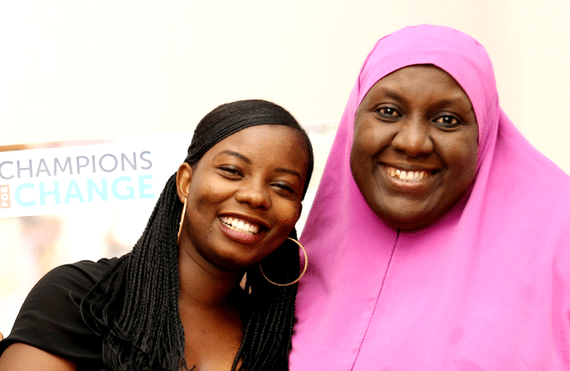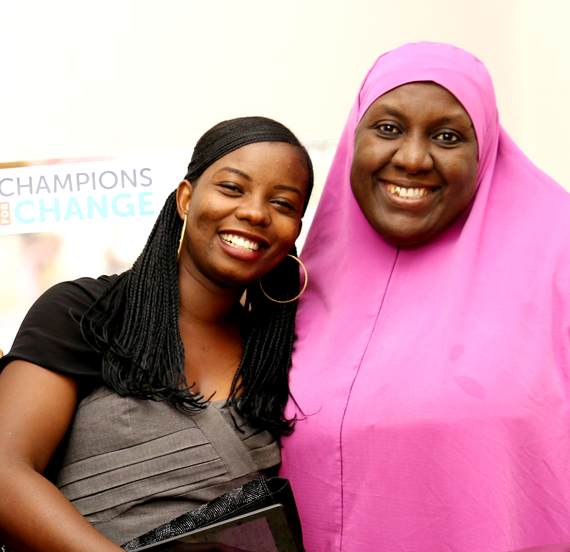Features Habiba Mohammed and Folashade Olumeyan of ABU Zaria’s Center for Girls Education, an NGO dedicated to strengthening key institutions and developing strategies to improve RMNCH in northern Nigeria.
Champions for Change (C4C) is pleased to continue our ‘Meet the Champions’ Series. This bi-monthly blog series highlights the work of 24 Nigerian leaders currently participating as C4C champions. C4C’s Champions in Nigeria are working together to save the lives of mothers, children and young women through innovative advocacy and leadership development. Nigeria is Africa’s largest economy, and yet tens of thousands of women and children die there each year due to lack of maternity care, preventable disease and poor health infrastructure, among other causes. This series brings a diversity of perspectives from around Nigeria to the table to discuss this critical moment in Nigeria’s history and how Nigerians can work together to build a healthy future for all.
Our series continues this week with an interactive discussion with Habiba Mohammed and Folashade Olumeyan of ABU Zaria’s Center for Girls Education, an NGO dedicated to enhancing the capacity of key institutions in Northern Nigeria and developing innovative strategies to improve maternal, adolescent, reproductive, and child health in the region. Their geographic focus is northern Nigeria, particularly northern Kaduna State.
Meet the Champions Series Interview #3
Center for Girls Education
Champions for Change: Why are you a Champion for women’s and children’s health issues in Nigeria?
Folashade: Growing up, I spent most of my time outside school with my father and watched with interest how other people lived their lives. I saw a difference in ways of life and standards of living; I saw the negligence of the government in terms of access to infrastructure and services, poor hygiene and nutrition (especially for women), exploitation and powerlessness in decision making, and lack of access to health care services. The discrimination between men and women was especially glaring. I noticed a lot of ignorance as the high rates of maternal, newborn and child mortality were attributed to the sovereignty of God instead of lifestyle choices and certain traditional practices. As I became more aware and interested in situations like these I wanted to be a voice for empowerment and emancipation.
Habiba: My work with adolescent girls led to my involvement in RMNCH work. I am passionate about educating young mothers on how to take care of themselves and their young ones, to ensure a healthy family and society. The CGE came to life as a result of research on maternal mortality and morbidity conducted by Doctoral fellows at the Amadu Bello University Teaching Hospital. The research findings explain that educating adolescent girls is one of the solutions that will help reduce maternal morbidity in Northern Nigeria. I was opportune to attend curriculum training on ‘Young Women Support Group’ hosted by PRRINN-MNCH in Kano, which taught me more and developed my interest in RMNCH.
C4C: What is the biggest challenge you face as an advocate for women and children’s health?
Folashade: The challenges I face with my work are two faced; there are those of the community and those of the program. In the community the biggest challenge is suspicion and misconception about our program objectives; in terms of advocacy, we have not been able to engage in advocacy involving major stakeholders, as we have focused more on interventions.
C4C: What’s your vision for the future of health care in Nigeria?
Habiba: My vision for the future of Nigeria’s health system is to wake up to a system where medical practitioners are accommodating, hospitals are equipped with drugs and facilities, ordinary humans get information about health, and clinics and hospitals are accessible to everyone.
Folashade: My vision for the future of Nigeria’s health system is to contribute to the transformation of the reproductive health landscape of Northern Nigeria such that every pregnancy is desired, and that pregnancy and child bearing no longer pose threats to the lives of women and their children.
C4C: Advocating for women’s rights can be a difficult job; what’s one of your most positive memories from your work?
Habiba: The success I am most proud of is seeing our girls completing secondary education and continuing with trainings to become mentors in their own community. It is so fulfilling.
Folashade: One of my favorite memories comes from my involvement in research work aimed at increasing access to life-saving interventions for prevention of Post-Partum Hemorrhage (PPH). We generated evidence on the suitability of Misoprostol to prevent PPH and the ability of local infrastructure to handle this drug at the community level. The effectiveness of our model was very laudable and led to a change in stakeholder perception after seeing their women empowered, involved in their health care and choosing health-promoting behaviors. There was also a remarkably drastic reduction in maternal mortality.
C4C: Please complete this statement: I am a Champion for Change because…
Habiba: …I am helping adolescent girls to be healthy role models in their communities through education.
Folashade: …I believe that when women thrive, the world thrives.
C4C: What is your favorite thing to do when you want to relax?
Habiba: I enjoy socializing so I will invite friends and relatives to my home or go visit them.
Folashade: I like to sing, chat and travel to new places.
We invite you to follow us on Twitter at @C4C_Champions and use the hashtag #MeetTheChampions to engage more closely with the blog series, the work of the 24 leaders whose work is being highlighted, and the larger conversation surrounding reproductive, maternal, newborn and child health in Nigeria.
Champions for Change saves the lives of women and children in Nigeria by empowering local leaders and organizations to improve reproductive, maternal, newborn and child health through advocacy, education, storytelling and strategic partnerships. Champions for Change leverages a program model developed by its sister initiative, Let Girls Lead, which has contributed to improved health, education and livelihoods for more than 7 million girls globally since 2009. This powerful model drives change through the passage of national laws, implementation of programs and distribution of funds to ensure access to quality health care, education and economic opportunity.
Champions for Change and Let Girls Lead are headquartered at the Public Health Institute in Oakland, CA, a leader in global health and development for 50 years.



